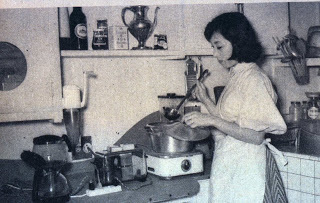Although I had some prior knowledge on the gender roles in Japanese culture, I did not know the full details of the matter until I researched a little. A great deal of what I read confirmed what I had previously thought, until I read a few articles about how women typically leave the workforce after marriage or during pregnancy and are considered part-time workers (Kumar, 2011). Because of this tendency, wage-inequality is a resulting issue that women face in the country (Kumar, 2011).
Although women are becoming more independent in the modern age, gender roles are still prominent throughout the nation (Smith, 2008). Men are still generally considered the bread-winners of a family and call the shots in business, while the women stay at home and take care of the children (Smith 2008). To me, this is somewhat saddening. It is unfortunate that women are still not perceived as entirely equal and it appears that the Japanese are stuck in the "2.5 kids and a dog" mentality that existed in the American 1950's.
Despite the fact that gender roles have been progressively evolving throughout the last century, Japan is still behind other leading countries as far as equality goes. According to an article I read, only 10% of managerial positions are held by women in Japan- paling in comparison to the United States where the percentage is around 43%. I was a little shocked to read this as it further confirmed my idea that women are not seen as equal in Japan. Whereas other countries are slowly progressing towards a balanced workforce, Japan is showing that it believes women are incapable of leading businesses and companies.
Although women are becoming more independent in the modern age, gender roles are still prominent throughout the nation (Smith, 2008). Men are still generally considered the bread-winners of a family and call the shots in business, while the women stay at home and take care of the children (Smith 2008). To me, this is somewhat saddening. It is unfortunate that women are still not perceived as entirely equal and it appears that the Japanese are stuck in the "2.5 kids and a dog" mentality that existed in the American 1950's.
Despite the fact that gender roles have been progressively evolving throughout the last century, Japan is still behind other leading countries as far as equality goes. According to an article I read, only 10% of managerial positions are held by women in Japan- paling in comparison to the United States where the percentage is around 43%. I was a little shocked to read this as it further confirmed my idea that women are not seen as equal in Japan. Whereas other countries are slowly progressing towards a balanced workforce, Japan is showing that it believes women are incapable of leading businesses and companies.
I was further surprised by the results of a study that was published several years ago. The study stated that only around 18.5% of males believed that family life was important, 40.2% of men believed work was important, and only 19.5% believed both were equally important ("Gender roles clearly," 2007). This shows that the average Japanese male has a tendency to be work-oriented, and is less likely to focus on family time. Again, this saddens me to hear as it puts a lot of the burden on the women to support the family at home and puts children at risk of growing up with only a single caring parent.
In summary, Japan, while evolving steadily, still has clearly defined gender roles. Despite a modern age where equality is on the rise, archaic mindsets still plague that nation and women are not seen as entirely similar to their male counterparts.
In summary, Japan, while evolving steadily, still has clearly defined gender roles. Despite a modern age where equality is on the rise, archaic mindsets still plague that nation and women are not seen as entirely similar to their male counterparts.
Sources:
Kumar, V. (2011, June 26). Japanese views on gender roles. Retrieved from http://expertscolumn.com/content/japanese-views-gender-roles
Smith, J. (2008, April 28). Japanese views on gender roles. Retrieved from http://www.helium.com/items/1009837-japanese-views-on-gender-roles
(2010). The japanese housewife. (2010). [Print Photo]. Retrieved from http://2.bp.blogspot.com/_W9Y5GzIbxWU/TKn4YQ5FW3I/AAAAAAAAAJA/EoCa2Qw4y3g/s320/japanese50s.jpg
Kumar, V. (2011, June 26). Japanese views on gender roles. Retrieved from http://expertscolumn.com/content/japanese-views-gender-roles
Smith, J. (2008, April 28). Japanese views on gender roles. Retrieved from http://www.helium.com/items/1009837-japanese-views-on-gender-roles
(2010). The japanese housewife. (2010). [Print Photo]. Retrieved from http://2.bp.blogspot.com/_W9Y5GzIbxWU/TKn4YQ5FW3I/AAAAAAAAAJA/EoCa2Qw4y3g/s320/japanese50s.jpg

 RSS Feed
RSS Feed